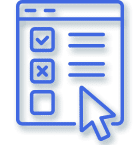What does an Addiction Counselor in Maryland do? What is Their Job Role?
If your dream is to become a substance abuse counselor in Maryland you've chosen an excellent field. According to the Bureau of Labor Statistics (BLS) the projected job growth for substance abuse counselors in Maryland is expected to be 30 percent in the next 10 years, which is much higher than the national projection of 23 percent. That means you'll be in high demand once you earn your licensure so now is the perfect time to plan your career.
The average median wage for substance abuse counselors in Maryland is $43,920, which is higher than the national average of $41,070. The highest 10 percent which typically represents those with higher education and more experience is $65,080.
In Maryland you must have an Associate's degree before you begin training as a substance abuse counselor. Because half of all substance abuse counselors hold a Master's degree you should make that your long-term goal. Since licensure requires a combination of education and experience with careful planning you can move through the ranks of licensure while in school and apply for the highest license soon after graduating with your Master's.
Compare Popular Online Substance Abuse Counseling Programs
Overview

Substance abuse counselors are overseen by the Board of Professional Counselors and Therapists, which is a division of the Maryland Department of Health.
Maryland has one training credential and three levels of licensure as well as a fourth certification for supervisors. Once you earn your Associate's degree you can become an Alcohol and Drug Trainee and begin accumulating experience hours under a certified supervisor. As you earn your higher degrees and gain more experience you can become certified as a Certified Supervised Counselor – Alcohol and Drug (CSC-AD), Certified Associate Counselor – Alcohol and Drug (CAC AD), Licensed Graduate Alcohol and Drug Counselor (LGADC), and Licensed Clinical Alcohol and Drug Counselor (LCADC), respectively.
Maryland is unique in that it requires alcohol and drug counselors to pass both an addiction counseling exam and a state law exam. This law exam is a test specifically for substance abuse counselors and not the extensive exam given to prospective attorneys. You should become familiar with each type of licensure and its requirements before enrolling in college so you can meet the educational standards needed to apply for each certification.
Educational requirements are quite strident and only specific studies are accepted. All credits must be from an accredited institution so you should verify credits are transferable and accepted by the Board before enrolling. You'll need a working knowledge of the credential application testing process and also need to understand what clinical supervision is so your work experience is accepted by the Board when you're ready to apply for each exam.
Once you earn your credential you'll be required to renew it in a timely manner and in the interim you're required to take specific continuing education coursework. You should plan to join one or more professional organizations as soon as you enroll in college so you can stay abreast of your chosen profession.
Maryland Licensing & Certifications for Associates & Independent Counselors
Alcohol and Drug Trainee (ADT)
To become an ADT you must hold at least an Associate's degree in a health and human services field which includes one credit hour in the ethics of alcohol and drug counseling or an equivalent degree as approved by the Board. You'll also need the name and credentials of your prospective supervisor before becoming an ADT. Your ADT credential must be renewed every two years and you may hold the credential for a total of six years.
Certified Supervised Counselor – Alcohol and Drug (CSC-AD)
A CSC-AD must have the same education as an ADT as well as specific coursework, 1,000 hours of supervised experience, and a completed internship before they can apply to take the National Certified Addiction Counselor, Level I (NCAC I) exam and the Maryland law exam.
Certified Associate Counselor – Alcohol and Drug (CAC-AD)
CAC AD must hold a bachelor's degree or higher in a health and human services counseling field or a related field approved by the Board. You'll also need to complete an internship, specific coursework, and 2,000 hours of substance abuse counseling experience under a certified supervisor and three years total experience before you can apply to take the NCAC II exam and the Maryland law exam.
Licensed Clinical Alcohol and Drug Counselor (LCADC)
To become a LCADC you'll need a master's degree with 60 semester hours or a Doctorate with 90 semester hours in the human services field. You'll also need to take specific coursework, three total years of experience, and at least 2,000 hours of supervised clinical experience before you can apply to take the Masters Addiction Counseling (MAC) of the National Board for Certified Counselors (NBCC) and the Maryland law exam.
Licensed Graduate Alcohol and Drug Counselor (LGADC)
LGADC is a certification given to those who have earned their degree and are working on their post-master's supervised practice requirements.
Education Requirements
According to the Maryland Division of State Documents to qualify for licensure you must attend a college or university that is accredited through one of the following regional accrediting bodies recognized by the U.S. Department of Education:
- The Middle States Association of Colleges and Schools — the Commission on Higher Education
- The New England Association of Schools and Colleges
- The North Central Association of Schools and Colleges
- The Northwest Association of Schools and of Colleges and Universities
- The Southern Association of Colleges and Schools
- The Western Association of Colleges and Schools
Before enrolling you should cross reference your school's courses with the required coursework for each level of certification. For example, your associate's degree should include one semester hour of ethics of alcohol and drug counseling so you can qualify as a ADT as soon as you have a potential supervisor. Your Bachelor's program should include an internship as approved by the Board as well as 30 semester hours of substance abuse counseling coursework so you can qualify to test for your CSC-AD.
As you progress through your education and career your coursework will become more exact so you should always be planning ahead and be knowledgeable about the classes you'll need to complete before the next credential level. For example, to qualify for the LCADC your Master's degree or Doctorate must include a three semester credit hour course taken at a regionally accredited educational institution in each of the following:
- Abnormal psychology
- Addictions treatment delivery
- Ethics that includes alcohol and drug counseling issues
- Group counseling
- Individual counseling
- Medical aspects of chemical dependency
As well as three of the following 3 semester credit hour courses taken at a regionally accredited educational institution:
- Family counseling
- Human development
- Theories of counseling
- Topics in substance-related and addictive disorders
- Treatment of co-occurring disorders
Your student advisor, clinical supervisor, or mentor can help you organize your degree semester plans and help you keep abreast of the coursework needed at each level.
CACREP Accredited Online Certification

Two types of accreditation are recognized in the United States; institutional and specialized. Institutional accreditation takes the entire institution into account while the specialized focus on professional preparation programs. The Council for Accreditation of Counseling and Related Educational Programs (CACREP) is a specialized accreditation that focuses on master’s and doctoral degree programs in counseling at colleges and universities worldwide. Only already-accredited institutions are eligible for CACREP review. The review for accreditation will center on programs offering graduate degrees in counseling.
Find Your Online Addiction Counseling Program
Choosing a CACREP-accredited program ensures that the program meets the highest of quality standards. Many counseling specialties are accredited bythe CACREP, including addiction counseling. Accredited addiction counseling programs prepare individuals to work with those affected by addictive behavior and their families. Addictive behaviors include alcohol, drugs, food, gambling, sex, and anything else that negatively affects your personal or work life by creating addiction behaviors.
CACREP-accredited programs will focus on treatment models and the phases of addiction including prevention, recovery, and relapse prevention. These 60-semester hour programs will include the application of interventions. When students choose a CACREP-accredited program they can be confident that:
- the program meets or exceeds national standards
- the program will focus on professional counseling rather than psychology oreducation
- the program has an excellent reputation
- CACREP graduates statistically receive higher scores on the National Counselor Examination for Licensure and Certification (NCE).
- the requirements for licensure will be met.
Board of Professional Counselors and Therapists
The Maryland State Board of Professional substance abuse Counselors and Therapists is regulated by the Maryland Professional Counselors and Therapists Act. The Board acts as the licensing authority for professional substance abuse counselors and therapists. They certify qualified candidates and provide licensing and renewal services, along with monitoring continuing education requirements. Complaints about violations of state regulations are investigated here, and disciplinary action is also the Board’s responsibility. In Maryland, this Board is required to submit an annual report to the Governor.
Address
4201 Patterson Avenue, 3rd Floor
Baltimore, MD 21215
Phone
(410) 764-2400
Website Address
https://health.maryland.gov/bopc/Pages/index.aspx
Licensure:
- Licensed Graduate Professional Counselor (LGPC)
- Licensed Clinical Professional Counselor (LCPC)
- Certified Professional Counselor (CPC) – Renewal only
Counselor Testing & Examination Process

Your first step in testing will always be to apply to test for the credential you're earning. Applications are done online at the Maryland Department of Health Board of Professional substance abuse Counselors and Therapists website and they do offer a Pre-Application Credential Evaluation so you can be sure you've completed the required coursework. For the actual exam application you'll need:
- Photograph
- Criminal History Records Check
- Education Transcripts
- Specific Coursework Verification
- Work Hours Supervision Verification
Once your application is approved the Board will notify you of the place, date, and time of your exams. The professional exam is given by NAADAC and the Maryland Law Test is given twice a month at the Board office in Baltimore.
Clinical Supervision Explained
Clinical supervision means you are working as a substance abuse counselor under the guidance of a Board approved licensed professional. Your clinical supervisor will be responsible for verifying your work hours and experience to the Board when you are ready to apply for each exam level so correctly tracking your work hours is one of the most important parts of their role. In addition to logging your clinical experience hours your supervisor is charged with:
Establishing a written contract for supervision before beginning supervision
Ensuring that the supervisee is practicing within the scope of their license
Determining the skill level at which the supervisee may practice
Focusing on raw data from the supervisee’s practice
Renewal and Continuing Education

In Maryland your substance abuse counseling credential must be renewed every two years. In the interim two years you must complete 40 hours of continuing professional education (CPE) with a minimum of 30 hours in workshops, symposiums, and seminars. 10 hours may be online as long as you have a certificate that shows NAADAC sponsorship. All CPU must be from one of the following Board approved sponsors:
- The American Counseling Association
- The National Board for Certified Counselors
- The International Certification & Reciprocity Consortium/Alcohol & Other Drug Abuse
- The National Association of Alcohol and Drug Abuse Counselors
- The Department of Health and Mental Hygiene
Your continuing education should progress your career in one or more of the following ways:
- Maintain professional competency
- Increase professional skills and knowledge
- Prepare for new roles or responsibilities in the practice of counseling or therapy
- Expand the science of counseling and therapy theory, method, or practice
Potential Counselor Career Path Options
- Addiction Counselor
- Alcohol and Drug Addiction Counselor
- Behavioral Health Specialist
- Certified Addiction Drug and Alcohol Counselor
- Chemical Dependency Counselor
- Mental Health Counselor
- School Counselor
- Substance Abuse Counselor
Associations & Organizations

As soon as you enroll in your associate's degree you should join one or more professional organizations within the realm of substance abuse counseling. A professional organization can offer mentorship, networking opportunities, and fellowship as well as keep you up to date on laws that may affect your practice, changes in licensure requirements, and other pertinent information for your career. A professional organization is also a great place to find online classes, continuing education, conventions and other meetings that will further your career. Here are a few organizations you can join as you launch your substance abuse counseling education:
- Maryland Association for Counseling and Development
- Maryland Counseling Association
- Maryland Association of Addiction Professionals (MAAP)
- National Association for Addiction Professionals
- Association for Addiction Professionals (NAADAC)
